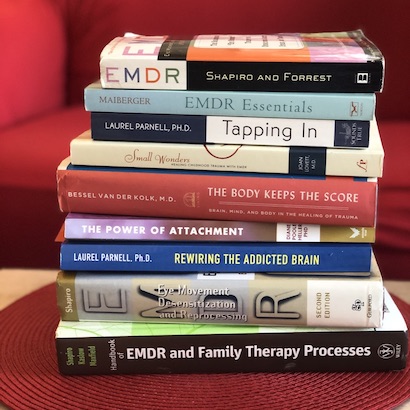EMDR
THERAPY
Eye Movement Desensitization Reprocessing (EMDR)
What is EMDR?
Eye Movement Desensitization and Reprocessing, or EMDR, is a psychotherapy technique that can be successful in helping people who struggle with trauma, anxiety, panic, disturbing memories, post-traumatic stress and many other emotional problems. Traumatic emotional experiences from the past can be deeply rooted in our subconscious and negatively impact our present. In a sense, EMDR therapy is a way to give the emotional healing system a ‘boost’ and allow us to truly leave the past behind us. EMDR can often relieve stress, bring about new insights, and allow us to feel better about ourselves. EMDR is considered a breakthrough therapy because it can bring quick and lasting relief for most types of emotional distress. It allows us to cope with the past, be more in touch with the present and can empower us to build a future that we desire.
How does EMDR work?
EMDR therapy uses bilateral stimulation (left/right eye movement or tactile stimulation), which repeatedly activates the opposite sides of the brain. This releases emotional experiences that are “trapped” in the nervous system and helps the neurological system to free itself of blockages and form new connections. The therapist works with the client to revisit the unpleasant thoughts, feelings, and memories of the past and uses bilateral movements to facilitate reprocessing. The more the client focuses on the memory the easier it becomes for the memory to come to life. As images arise during the EMDR session, they are processed by the bilateral stimulation, resulting in painful feelings being replaced with peaceful, loving and resolved feelings.
Who can I see for EMDR?
EMDR trained therapists:
What problems can EMDR help with?
- Abuse (physical, sexual, emotional, verbal, domestic)
- Addictions
- Anger
- Anxiety or panic
- Childhood trauma
- Chronic pain
- Depression, isolation, motivation issues
- Fears, phobias
- Grief and loss
- Inappropriate guilt or shame
- Performance and test anxiety
- Post traumatic stress (PTSD)
- Relationship problems
- Self-Esteem
- Sleep issues
- Trauma
- Victim to violent crime
- Witness to violence
Eye Movement Desensitization Reprocessing (EMDR)
What is EMDR?
Eye Movement Desensitization and Reprocessing, or EMDR, is a psychotherapy technique that can be successful in helping people who struggle with trauma, anxiety, panic, disturbing memories, post-traumatic stress and many other emotional problems. Traumatic emotional experiences from the past can be deeply rooted in our subconscious and negatively impact our present. In a sense, EMDR therapy is a way to give the emotional healing system a ‘boost’ and allow us to truly leave the past behind us. EMDR can often relieve stress, bring about new insights, and allow us to feel better about ourselves. EMDR is considered a breakthrough therapy because it can bring quick and lasting relief for most types of emotional distress. It allows us to cope with the past, be more in touch with the present and can empower us to build a future that we desire.
How does EMDR work?
EMDR therapy uses bilateral stimulation (left/right eye movement or tactile stimulation), which repeatedly activates the opposite sides of the brain. This releases emotional experiences that are “trapped” in the nervous system and helps the neurological system to free itself of blockages and form new connections. The therapist works with the client to revisit the unpleasant thoughts, feelings, and memories of the past and uses bilateral movements to facilitate reprocessing. The more the client focuses on the memory the easier it becomes for the memory to come to life. As images arise during the EMDR session, they are processed by the bilateral stimulation, resulting in painful feelings being replaced with peaceful, loving and resolved feelings.
Who can I see for EMDR?
EMDR trained therapists:
What problems can EMDR help with?
- Abuse (physical, sexual, emotional, verbal, domestic)
- Addictions
- Anger
- Anxiety or panic
- Childhood trauma
- Chronic pain
- Depression, isolation, motivation issues
- Fears, phobias
- Grief and loss
- Inappropriate guilt or shame
- Performance and test anxiety
- Post traumatic stress (PTSD)
- Relationship problems
- Self-Esteem
- Sleep issues
- Trauma
- Victim to violent crime
- Witness to violence

“The past affects the present even without our being aware of it.”
—Francine Shapiro, Ph.D
